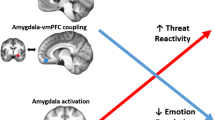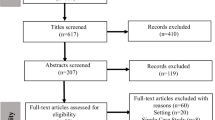Abstract
Children with Prader-Willi syndrome (PWS) and autism spectrum disorder (ASD) present with challenges in social cognitive ability, Research comparing PWS to ASD is important given the implication of 15q11-q13 region in the biology of autism. However, recent findings question the accuracy of relying solely on parent report in behavioral characterization. Thus, this study examined social cognition in an observable pretend play task and by parent report in 50 preschool children (ages 3–5) with PWS, by subtype, compared to ASD. Behaviorally, the paternal deletion subtype expressed overall higher functioning, whereas the maternal uniparental disomy subtype performed more similarly to the ASD group. Results are the first to show deficits in social cognitive ability early in development. The severity and differences in deficits between PWS subtypes are important in informing early intervention efforts.
Similar content being viewed by others
References
Bennett, J., Hodgetts, S., Mackenzie, M., Haqq, A., & Zwaigenbaum, L. (2017). Investigating autism-related symptoms in children with Prader-Willi syndrome: A case study. International Journal of Molecular Sciences, 18(3), 517.
Bishop, S. L., Guthrie, W., Coffing, M., & Lord, C. (2011). Convergent validity of the Mullen Scales of Early Learning and the differential ability scales in children with autism spectrum disorders. American Journal on Intellectual and Developmental Disabilities, 116(5), 331–343. https://doi.org/10.1352/1944-7558-116.5.331.
Blumberg, S. J., Bramlett, M. D., Kogan, M. D., Schieve, L. A., Jones, J. R., & Lu, M. C. (2013). Changes in prevalence of parent-reported autism spectrum disorder in school-aged US children: 2007 to 2011–2012. National Center for Health Statistics Reports. Number 65. National Center for Health Statistics.
Choudhury, S., Blakemore, S. J., & Charman, T. (2006). Social cognitive development during adolescence. Social Cognitive and Affective Neuroscience, 1(3), 165–174.
Cicchetti, D. V. (1994). Guidelines, criteria, and rules of thumb for evaluating normed and standardized assessment instruments in psychology. Psychological Assessment, 6(4), 284.
Dawson, G., Toth, K., Abbott, R., Osterling, J., Munson, J., Estes, A., et al. (2004). Early social attention impairments in autism: social orienting, joint attention, and attention to distress. Developmental Psychology, 40(2), 271.
Dimitropoulos, A., Ferranti, A., & Lemler, M. (2013a). Expressive and receptive language in Prader-Willi syndrome: Report on genetic subtype differences. Journal of Communication Disorders, 46(2), 193–201.
Dimitropoulos, A., Ho, A., & Feldman, B. (2013b). Social responsiveness and competence in Prader-Willi syndrome: Direct comparison to autism spectrum disorder. Journal of Autism and Developmental Disorders, 43(1), 103–113.
Dimitropoulos, A., & Schultz, R. T. (2007). Autistic-like symptomatology in Prader-Willi syndrome: A review of recent findings. Current Psychiatry Reports, 9(2), 159–164.
Dunn, L. M., & Dunn, D. M. (2007). PPVT-4: Peabody picture vocabulary test. Minneapolis, MN: Pearson Assessments.
Dykens, E. M., Roof, E., Hunt-Hawkins, H., Dankner, N., Lee, E. B., Shivers, C. M., et al. (2017). Diagnoses and characteristics of autism spectrum disorders in children with Prader-Willi syndrome. Journal of Neurodevelopmental Disorders, 9(1), 18.
Fehr, K. K., & Russ, S. W. (2013). Aggression in pretend play and aggressive behavior in the classroom. Early Education & Development, 24(3), 332–345.
Fehr, K. K., & Russ, S. W. (2016). Pretend play and creativity in preschool-age children: Associations and brief intervention. Psychology of Aesthetics, Creativity, and the Arts, 10(3), 296.
Geschwind, D. H., & Levitt, P. (2007). Autism spectrum disorders: Developmental disconnection syndromes. Current Opinion in Neurobiology, 17(1), 103–111.
Gray, D. E. (2006). Coping over time: The parents of children with autism. Journal of Intellectual Disability Research, 50(12), 970–976.
Gresham, F. M., & Elliott, S. N. (2008). Social skills improvement system: Rating scales manual. Minneapolis, MN: NCS Pearson.
Higgins, D. J., Bailey, S. R., & Pearce, J. C. (2005). Factors associated with functioning style and coping strategies of families with a child with an autism spectrum disorder. Autism, 9(2), 125–137.
Hobson, R. P., & Lee, A. (1999). Imitation and identification in autism. The Journal of Child Psychology and Psychiatry and Allied Disciplines, 40(4), 649–659.
Hoffmann, J., & Russ, S. (2012). Pretend play, creativity, and emotion regulation in children. Psychology of Aesthetics, Creativity, and the Arts, 6(2), 175.
Hogart, A., Wu, D., LaSalle, J. M., & Schanen, N. C. (2010). The comorbidity of autism with the genomic disorders of chromosome 15q11. 2-q13. Neurobiology of Disease, 38(2), 181–191.
Hudry, K., Leadbitter, K., Temple, K., Slonims, V., McConachie, H., Aldred, C., et al. (2010). Preschoolers with autism show greater impairment in receptive compared with expressive language abilities. International Journal of Language & Communication Disorders, 45(6), 681–690.
Jarrold, C. (2003). A review of research into pretend play in autism. Autism, 7(4), 379–390.
Kaugars, A. S., & Russ, S. W. (2009). Assessing preschool children’s pretend play: Preliminary validation of the affect in play scale-preschool version. Early Education and Development, 20(5), 733–755.
Lam, Y. G., & Yeung, S. S. S. (2012). Cognitive deficits and symbolic play in preschoolers with autism. Research in Autism Spectrum Disorders, 6(1), 560–564.
Marcelo, A. K., & Yates, T. M. (2014). Prospective relations among preschoolers’ play, copying, and adjustment as moderated by stressful events. Journal of Applied Developmental Psychology, 35(3), 223–233. https://doi.org/10.1016/j.appdev.2014.01.001.
Mullen, E. M. (1995). Mullen scales of early learning (pp. 58–64). Circle Pines, MN: AGS.
Mundy, P., Sigman, M., & Kasari, C. (1990). A longitudinal study of joint attention and language development in autistic children. Journal of Autism and Developmental Disorders, 20(1), 115–128.
Nurmi, E. L., Dowd, M., Tadevosyan-Leyfer, O., Haines, J. L., Folstein, S. E., & Sutcliffe, J. S. (2003). Exploratory subsetting of autism families based on savant skills improves evidence of genetic linkage to 15q11-q13. Journal of the American Academy of Child and Adolescent Psychiatry, 42(7), 856–863.
Olson, K. R., & Dweck, C. S. (2008). A blueprint for social cognitive development. Perspectives on Psychological Science, 3(3), 193–202.
Patriquin, M. A., Scarpa, A., Friedman, B. H., & Porges, S. W. (2013). Respiratory sinus arrhythmia: A marker for positive social functioning and receptive language skills in children with autism spectrum disorders. Developmental Psychobiology, 55(2), 101–112.
Russ, S. W., & Association, American Psychological. (2014). Pretend play in childhood: Foundation of adult creativity (pp. 45–62). Washington, DC: American Psychological Association.
Rutter, M., Bailey, A., & Lord, C. (2003). SCQ. The social communication questionnaire. Torrance, CA: Western Psychological Services.
Rydell, A. M., Hagekull, B., & Bohlin, G. (1997). Measurement of two social competence aspects in middle childhood. Developmental Psychology, 33(5), 824.
Seja, A. L., & Russ, S. W. (1999). Children’s fantasy play and emotional understanding. Journal of Clinical Child Psychology, 28(2), 269–277.
Senju, A. (2013). Atypical development of spontaneous social cognition in autism spectrum disorders. Brain and Development, 35(2), 96–101.
Sparrow, S. S., Balla, D. A., & Cicchetti, D. V. (2005). Vineland II: Vineland adaptive behavior scales. Circle Pines, MN: American Guidance Service.
Tager-Flusberg, H., & Sullivan, K. (2000). A componential view of theory of mind: Evidence from Williams syndrome. Cognition, 76(1), 59–90.
White, S. W., Keonig, K., & Scahill, L. (2007). Social skills development in children with autism spectrum disorders: A review of the intervention research. Journal of Autism and Developmental Disorders, 37(10), 1858–1868.
Yates, T. M., & Marcelo, A. K. (2014). Through race-colored glasses: Preschoolers’ pretend play and teachers’ ratings of preschooler adjustment. Early Childhood Research Quarterly, 29(1), 1–11.
Zyga, O., Russ, S., Ievers-Landis, C. E., & Dimitropoulos, A. (2015). Assessment of pretend play in Prader-Willi syndrome: A direct comparison to autism spectrum disorder. Journal of Autism and Developmental Disorders, 45(4), 975–987.
Acknowledgments
This research would not be possible without the financial support of The Foundation for Prader-Willi Research (FPWR) and the Mt. Sinai Catalytic Award through the International Center for Autism Research and Education (ICARE). Further we would like to thank lab members Ellen Doernberg and Brooke Bailey for their time and efforts in data collection and coding. Lastly, we deeply thank all of the families who participated in this research program.
Funding
This study was funded by the Foundation for Prader-Willi Research (FPWR).
Author information
Authors and Affiliations
Contributions
AD concieved of the study, and together with OZ and SWR developed the design of the study. OZ assisted in the coordination of the study, performed the statistical analyses, and drafted the initial manuscript. All authors interpreted the data, made revisions, and approved the final manuscript.
Corresponding author
Ethics declarations
Conflict of interest
The authors declare that they have no conflict of interest.
Ethical Approval
All procedures performed in studies involving human participants were in accordance with the ethical standards of Case Western Reserve University Institutional Review Board (IRB-2015-1240) and with the 1964 Helsinki declaration and its later amendments or comparable ethical standards.”
Informed Consent
“Informed consent was obtained from all individual participants included in the study.”
Additional information
Publisher's Note
Springer Nature remains neutral with regard to jurisdictional claims in published maps and institutional affiliations.
Rights and permissions
About this article
Cite this article
Dimitropoulos, A., Zyga, O. & Russ, S.W. Early Social Cognitive Ability in Preschoolers with Prader–Willi Syndrome and Autism Spectrum Disorder. J Autism Dev Disord 49, 4441–4454 (2019). https://doi.org/10.1007/s10803-019-04152-4
Published:
Issue Date:
DOI: https://doi.org/10.1007/s10803-019-04152-4




